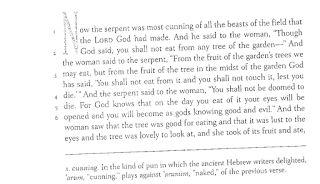Arum is a Hebrew adjective that one can opt to translate "crafty, shrewd, cunning, deceptive, sensible" or "subtle." I specifically want to know how the word should be treated in Genesis. E.A. Speiser renders Genesis 3:1: "Now the serpent was the sliest of all the wild creatures that God Yahweh had made. Said he to the woman, 'Even though God told you not to eat of any tree in the garden . . .'" Compare the NET Bible.
The adjective occurs 11 times in the Hebrew Bible.
"The connotation is determined by the context" (Spiros Zodhiates, The Complete Word Study: Old Testament, 2352).
Genesis 3:1 (JPS Targum)-"Now the serpent was more subtle than any beast of the field which the
LORD God had made. And he said unto the woman: 'Yea, hath God said: Ye
shall not eat of any tree of the garden?' "
(OJB)-"Now the Nachash was more arum
(cunning, crafty, wiley) than any beast of the sadeh which Hashem Elohim
had made. And he said unto the isha, Really? Hath Elohim said, Ye shall
not eat of kol etz hagan?"
LXX-ὁ δὲ ὄφις ἦν φρονιμώτατος πάντων τῶν θηρίων τῶν ἐπὶ τῆς γῆς ὧν ἐποίησεν κύριος ὁ θεός καὶ εἶπεν ὁ ὄφις τῇ γυναικί τί ὅτι εἶπεν ὁ θεός οὐ μὴ φάγητε ἀπὸ παντὸς ξύλου τοῦ ἐν τῷ παραδείσῳ
See Job 5:12; Proverbs 14:8, 15, 18; 22:3. Compare S. Driver, The Book of Genesis, pages 44-45.
Robert Alter (Genesis):
Sporadic theological and historical musings by Edgar Foster (Ph.D. in Theology and Religious Studies and one of Jehovah's Witnesses).
Saturday, May 14, 2022
Arum and Genesis 3:1
Subscribe to:
Post Comments (Atom)

6 comments:
An interesting issue appeared here:-
https://hermeneutics.stackexchange.com/questions/38632/why-is-%D7%A2%D6%B2%D7%A8%D7%95%D6%BC%D7%9E%D6%BC%D6%B4%D6%94%D7%99%D7%9D-gen-225-translated-naked-and-in-the-very-next-verse-its
I read that page, but the answer seems to be that we have a pun in Genesis 2:25 and 3:1 as Alter and many others observe. However, I do not believe that arum denotes nakedness/being nakedness.
being naked
https://jbqnew.jewishbible.org/assets/Uploads/421/JBQ_421_1_wordplay.pdf
I've got that one, but haven't finished reading it yet. I'm working on this piece now: https://www.zora.uzh.ch/id/eprint/158405/8/Schmid_Ambivalence_of_Human_Wisdom_2018.pdf
From the TCBC Genesis commentary:
The description of the serpent’s shrewdness (’arum [TH6175, ZH6874]; 3:1) employs a wordplay with the description of the humans’ nakedness (’arummim, [TH6174, ZH6873]; 2:25). The similar sounding words indicate that their integrity (see commentary on 2:25) was the target of his shrewd dealings. Shrewdness is not in itself an evil characteristic; the book of Proverbs is designed to train people to have this quality (Prov 1:4). The word denotes wariness, knowing where the traps and pitfalls are.
Post a Comment